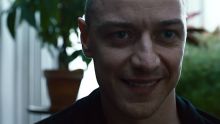I wanted to be so many things when I grew up: a doctor, a police officer, a marine biologist, Nick Carter's wife, an author.
But I never once dared to dream about being an actor, because when I looked on the screen, there was hardly anyone who looked anything like me – and when there was, they played bookish nerds, losers, the unlucky in love.
More Trailers Videos
Trailer: The Edge of Seventeen
Everyone knows that growing up is hard, and life is no easier for high school junior Nadine, who is already at peak awkwardness when her all-star older brother Darian starts dating her best friend Krista.
That's why the new teen comedy The Edge of Seventeen feels like such a revelation.
In the charming coming-of-age film, co-produced by Chinese company Huayi Brothers, Chinese-Canadian newcomer Hayden Szeto plays Erwin Kim, an adorably shy Korean-American teenager smitten with protagonist Nadine Franklin (Hailee Steinfeld), who's equally taken with the school's resident (white) bad boy. As the friendship between Nadine and Erwin develops, she discovers that he's not at all what she expected. (And – spoiler – he totally gets the girl.)

In one scene, Nadine tries to guess Erwin's parents' personalities, conjuring the stereotypes that have eclipsed the diverse experiences of Asian families for years: "Your mom gets on you about your grades, practising your instrument. She makes you great egg sandwiches after a few years of owning a small restaurant downtown. Your dad – quiet, gruff, never really says 'I love you' but with his stoic presence, you know that he cares."
She immediately follows up, "I'm really hoping none of that was racist. But now I'm thinking all of it was."
Despite the problematic casting of a Chinese actor as a Korean character (we're not all the same, folks), it's refreshing to see this self-awareness on the big screen as Hollywood pokes fun at its own prejudices. Erwin is portrayed as a regular high school student, and his ethnicity is not a plot point – it's a part of who he is, but it doesn't define him. In a pool scene, Erwin removes his shirt to reveal an unexpectedly muscular body (I had to keep myself from screaming "RIG" aloud in the cinema), and vocally expresses his sexual desire – the filmmakers subvert stereotypes of Asian men both subtly and enormously.
And yet, despite Szeto being one of the film's main characters and brightest lights, the only hint of his existence within the film in its promotional material is a split-second in one of the trailers, with minor characters getting more screen time. In another trailer, he doesn't appear at all.
Is it because, despite the leaps and bounds the industry is making, Asian men are still seen as unmarketable? Is it the same prejudice that sees Hollywood cast white actors in roles that should have gone to people of colour (Ghost in the Shell, Doctor Strange, Aloha) or, worse still, make up white actors to look like Asian people (Breakfast at Tiffany's, Short Circuit)?
We face an uncomfortable double standard when it comes to sexual perceptions of Asian people. Asian women are often fetishised as docile, subservient creatures whose sole purpose is providing sexual or emotional satisfaction (see: Xu Qing's silent character in 2012's Looper, credited as "Old Joe's wife", because we don't have identities outside our relationships with white men; or Harry Potter's love interest Cho Chang, a "bestselling caricature", as Rachel Rostad brilliantly puts it). Or we're oversexualised and "crazy" (see: Brenda Song in The Social Network). These characters exist solely as pawns in the white man's game, and the "yellow fever" trope rings true in real life too – being an Asian woman on online dating sites is a truly terrifying experience, let me tell you.
On the other hand, Asian men are often stripped of sexuality altogether, commonly portrayed only as karate masters (see: Jackie Chan) or socially hopeless, high pants-wearing nerds with thick accents (see: Brian Tochi in Revenge of the Nerds). Every time Gedde Watanabe's Long Duk Dong appears on screen in 1984's Sixteen Candles, a gong plays, and he's only perceived as desirable by a character nicknamed "Lumberjack" for her large, awkward physique. Of course the only girl who wants the Asian guy is also undesirable by Hollywood standards. Though said films were released decades ago, these stereotypes continue to pigeonhole Asian actors.
It plays out the same way in the off-screen world: statistics show that Asian men receive the fewest hits on online dating websites and are rated lowest across the board heterosexually, while "no blacks, no Asians" is a common catch-cry on gay apps like Grindr. The opposite has been shown to be true for Asian women. As Asians, we're a blank fantasy or nothing at all.
I want to see an Asian name front and centre on posters for films that aren't about martial arts or geishas.
The Edge of Seventeen is the first teenage mainstream feature film I've seen where a male Asian character is presented as a three-dimensional figure who both expresses and is the recipient of genuine sexual attraction. Positive changes are happening on the small screen, too – Aziz Ansari's Master of None defies stereotypes while also exploring the complexities of second-generation life, and The Walking Dead and Selfie have both starred Asian men as prominent love interests. SBS's The Family Law dives into the coming-of-age of a young gay Chinese boy, who openly ogles his shirtless neighbour in one memorable scene.
We've come a long way, but there's still so much progress to be made. I want to see more people of colour on screens playing a wide array of personalities, because we are not all the same. I want to see Asian men who don't have sharp, Western-like features playing leading roles. I want to see an Asian name front and centre on posters for films that aren't about martial arts or geishas.
I want the Asian children of the future to look at screens and see themselves reflected in heroes, villains, love interests and beyond; to know that being Asian doesn't limit their potential.
















0 comments
New User? Sign up